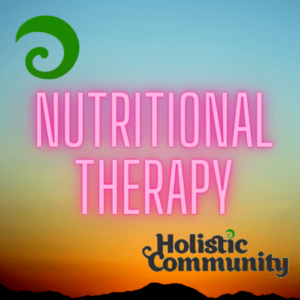What is Nutritional Therapy?
 Nutritional Therapy focuses on what you feed your body and the effects these foods have on you. Nutritional Therapy uses diet and lifestyle changes, together with nutritional supplementation, to address symptoms caused by biochemical imbalances and nutritional deficiencies.
Nutritional Therapy focuses on what you feed your body and the effects these foods have on you. Nutritional Therapy uses diet and lifestyle changes, together with nutritional supplementation, to address symptoms caused by biochemical imbalances and nutritional deficiencies.
Who can benefit?
Eating a well balanced range of healthy foods can be beneficial to everyone. To achieve optimum health, Nutritional Therapy enables you to take control and choose the best foods and supplements to suit your needs.
Nutritional Therapy has also been known to help with a number of health goals including:
- increasing energy levels
- boosting the immune system to stave off colds and flu
- improving levels of concentration and alertness
- increasing the ability to handle stress
Other commonly helped conditions include:
- Asthma
- Allergies
- Depression
- Digestive problems
- Fatigue
- IBS
- Infertility
- PMS
- Skin conditions
How do I find a Nutritional Therapist?
Use the ‘Find a Therapist‘ feature at Holistic Community.
Alternatively visit the BANT website – www.bant.org.uk – for a registered Nutritional Therapist. BANT was established in February
1997 and promotes high standards of practice and ethics within the profession.
BANT holds a register of practitioners who are fully qualified in both the science of nutrition as well as clinical practice. It also insists practitioners are fully insured to practice.
What does a session involve?
During the initial consultation, you will often fill in a questionnaire looking at a number of lifestyle factors such as levels of stress, exercise and current diet, as well as general
health. Nutritional Therapists identify the link between symptoms of sub-optimum health and specific nutritional deficiencies.
Recommendations generally include dietary changes, a vitamin and mineral supplement programme and lifestyle changes. Occasionally, diagnostic tests such as such as hair mineral analysis or food
intolerance tests may be recommended.
An initial session normally lasts for approximately 60 minutes, with follow-up consultations lasting for 30-60 minutes.
by Kenny Tranquille Dip.ION (mBANT)
Nutritional Therapy Links:
British Association for Nutritional Therapy – a professional body for Nutritional Therapists.
British Nutrition Foundation – a site providing healthy eating information, resources for schools, news items, recipes etc.
Nutritional Therapy Council – the regulatory body for nutritional therapy.
The Institute for Optimum Nutrition – an independent educational trust, established for the study, research and practice of Nutrition
